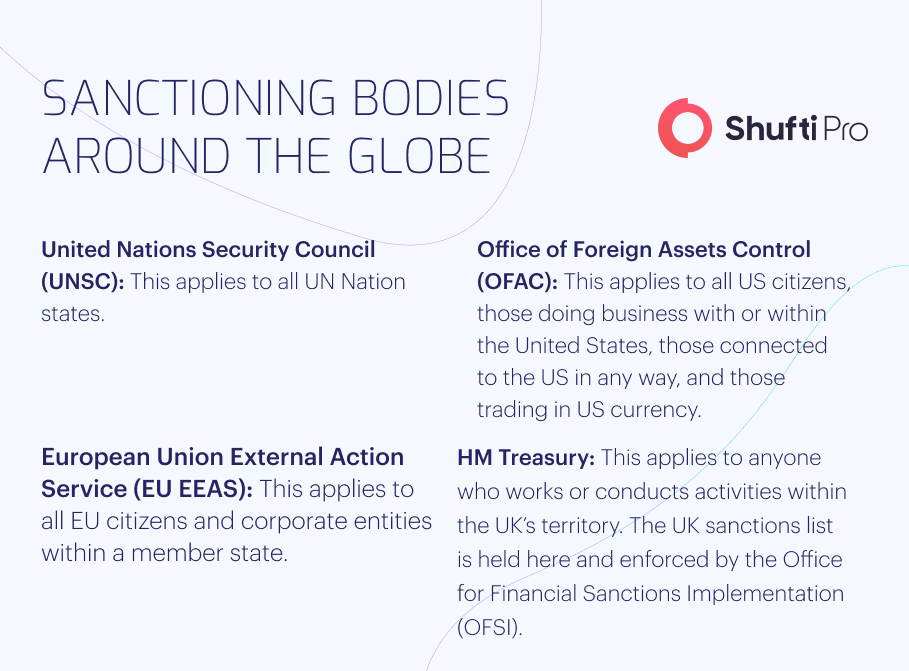The ‘What’, ‘How’ and ‘Why’ of Sanctions Screening | A Basic Guide

International collaboration and cross-border transactions have become the norm in our interconnected digital world. This has made compliance with regulatory frameworks and global sanctions more critical. As supply chains and financial systems have become more complex, they have become susceptible to exploitation by scammers with illicit intentions. The rising number of Anti-Money Laundering (AML) violations highlights the significance of sanction screening solutions in this digital age.
What are Sanctions?
Sanctions are the preventive measures governments enact on countries, businesses, and individuals to mitigate the risk of crimes by such parties. Sanctions are imposed on individuals and their organisations suspected of being involved in money laundering, terrorism financing, drug trafficking, and countries violating human rights. Sanctions ensure that high-risk customers can not continue their illicit activities within their country and across the globe. These measures include diplomatic sanctions, financial sanctions, and military sanctions.
What is a Sanctions List?
Sanctions lists comprise countries, firms and individuals with greater risk of money laundering and fraud. The entities appear on sanctions lists because of their history of being involved in illegal activity. Several lists are available to identify these criminals, including international sanctions lists from the EU, the UK, the UN and the US.
Financial institutions and other businesses must perform sanction list screening on their new customers. The screening serves as a warning to reject a new client during onboarding or to conduct Enhanced Due Diligence (EDD) if the customer is allowed to onboard.
Governmental bodies that control sanctions around the globe include the United Nations Security Council (UNSC) for the UN, the Office of Foreign Assets Control (OFAC) in the US, the European Union External Action Service (EEAS) in the EU, and Her Majesty’s Treasury (HM Treasury) in the UK.

How Does Sanctions Screening Work?
All financial firms must fulfil sanctions screening requirements to comply with Know Your Customer (KYC) and AML regulations. Every financial service company must have a programme to perform robust sanctions screening.
The programme should include:
- Mandatory Sanctions List Search: Deciding which lists to employ to screen new clients is imperative. It is advisable to explore any internal sources within the firm during the onboarding process to identify those who can pose a high risk of crime.
- Process to Match with the Sanctions List: In case of any high-risk individual or business, a screening system should be in place to decide whether to proceed with the onboarding procedure. In some cases, the customer is rejected immediately, whilst others may be designated as high risk but are given permission to open an account. There is a need to make a list of criteria to check individuals’ eligibility.
- Government and Managerial Supervision: The programme will include using the criteria set by your organisation and governmental guidelines. Your firm is responsible for making decisions based on the information available.
- Customer Due Diligence (CDD): Your firm needs to conduct a CDD to verify customers’ identity, source of money, and transactional patterns.
- Risk Assessments: Each customer must be assessed on their risk level. For example, Politically Exposed Persons (PEPs) are always high-risk customers if they can open their accounts.
- Establishment of Internal Controls: Your firm must establish robust internal controls, working with AML regulations and sanctions lists. For example, your organisation must have a policy to deal with false positives.
- Ongoing Monitoring: Customers with a high crime risk require thorough monitoring. Your firm must monitor their account activity regularly and make an audit trail.
- Continual Training: The employees tasked to conduct onboarding and risk assessment must be given ongoing training to stay ahead of the changing AML regulations.
Why Do Businesses Require Sanctions Screening?
Sanctions screening is required to prevent illicit activities that wreak havoc on businesses and customers. It is legally binding in many countries, such as the US, Canada, the UK, and the EU. Failure to adhere to sanctions regulations results in legal, financial, and reputational risks for the organisations. Non-compliance includes fines and, in severe cases, leads to criminal charges and loss of company’s licences.
Top Tips for Effective Sanctions Screening
- Prepare Customer Data Well: Rising non-compliance costs emphasise the operational efficacy of KYC and AML controls. Streamlining data-capturing processes, establishing unified data repositories and investing in enhancing client and third-party data can boost effectiveness.
- Use Reliable Technology Supporting Sanctions Screening: Screening solutions must handle several lists and batch screening. They can set up predefined searches specific to a firm’s risk exposure and standards.
- Screen against Comprehensive Sanctions Data: Use well-researched and updated global data when conducting checks. The data should include the latest lists of high-risk customers such as PEPs, those on the sanctions list, who have negative media coverage, and records of being involved in crimes.
How Can Shufti Help?
At Shufti, we are dedicated to offering AI-powered sanctions screening services tailored to our customer’s unique needs. With our robust AML screening solution, we help businesses mitigate the risk of fraud whilst achieving regulatory compliance.
Here’s what makes our AML compliance solution stand out:
- Screen against 1700+ data sources
- Comprehensive PEP and sanction list screening
- The Watchlist database is updated every 15 minutes
- Single API integration makes it seamless for developers
- Ongoing monitoring to identify any new risks and changes in business status for enhanced risk profiling and updated risk status
- Robust watchlist management to conduct safe B2B transactions
- Conducting regular AML checks to boost conversion rates and prevent money laundering and other financial crimes
- Adopting best AML practices to reduce false positives and optimise customer onboarding
Looking for a customised AML compliance solution to avoid hefty penalties?











